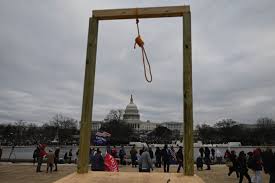Sure, my client incited a seditious riot that got people killed

But there’s a larger principle here!
Former President Donald Trump’s legal team argued Tuesday that he cannot be convicted by the Senate because he is no longer in office, previewing what’s likely to be one of the biggest points of contention during Trump’s Senate impeachment trial that begins next week.
Trump’s lawyers filed a 14-page response to the House’s impeachment effort on Tuesday, its first filing ahead of the trial. Trump’s lawyers, Bruce Castor and David Schoen, argued both that the Senate cannot vote to impeach Trump when he no longer holds office as well as that Trump’s speech about the election and before the January 6 riots is protected by the First Amendment.
“The constitutional provision requires that a person actually hold office to be impeached. Since the 45th President is no longer “President,” the clause ‘shall be removed from Office on Impeachment for…’ is impossible for the Senate to accomplish,” Trump’s team wrote.
The House impeachment managers, in their pre-trial brief filed Tuesday, pushed back directly on that point, which Senate Republicans have coalesced around as a reason to acquit Trump, arguing there is ample history and precedent to hold a trial and convict Trump, who was impeached by the House while still in office.
“There is no ‘January Exception’ to impeachment or any other provision of the Constitution,” the managers wrote. “A president must answer comprehensively for his conduct in office from his first day in office through his last.”House Democrats noted that Trump was impeached while he still was president, pushing back on Senate Republican arguments that Congress cannot impeach a former official. Still, they argued there’s precedent for impeaching former officials, too, as there have been a handful of cases in US history.The House impeachment managers charged that former Trump is “singularly responsible” for inciting the insurrection at the Capitol last month, arguing that the Senate should convict Trump and bar him from holding future office after he “threatened the constitutional system that protects the fundamental freedoms we cherish.
“The House managers laid out their case against Trump in an 80-page pre-trial legal brief filed Tuesday morning, in which they accused Trump of stirring up violence against Congress in an attempt to upend the peaceful transfer of power. They also provided a constitutional defense for holding an impeachment trial of a former president.
“President Trump’s responsibility for the events of January 6 is unmistakable,” the House impeachment team wrote. “President Trump’s effort to extend his grip on power by fomenting violence against Congress was a profound violation of the oath he swore. If provoking an insurrectionary riot against a Joint Session of Congress after losing an election is not an impeachable offense, it is hard to imagine what would be.
“Both the House impeachment managers and Trump’s legal team are expected to submit additional pre-trial briefs ahead of the start of the trial on February 9. The legal briefings will provide the backdrop for a case in which the House impeachment managers face a skeptical Senate Republican conference. Last week, 45 of the 50 GOP senators voted to support dismissing the trial on constitutional grounds, a sign that the 67 votes required for conviction are unlikely to materialize.
Trump’s legal filing briefly touched on the former President’s baseless and false claims that the election was stolen from him, disputing that his claims were false but arguing they were protected speech nevertheless.
“After the November election, the 45th President exercised his First Amendment right under the Constitution to express his belief that the election results were suspect, since with very few exceptions, under the convenient guise of Covid-19 pandemic ‘safeguards’ states election laws and procedures were changed by local politicians or judges without the necessary approvals from state legislatures,” Trump’s lawyers wrote. “Insufficient evidence exists upon which a reasonable jurist could conclude that the 45th President’s statements were accurate or not, and he therefore denies they were false.”
The practical question facing the Senate is not the technical legal question of whether Trump’s flagrant incitement of the deadly insurrection against the Congress was flagrant enough to clear the extremely high bar set by Brandenburg v. Ohio for unprotected speech in such contexts. That is a question of criminal law, which is completely irrelevant to this context.
Nor is the arid formalism of the defense that since Trump left office after being impeached but before being convicted of any more relevance here.
The only relevant question here is this: Was Trump’s conduct bad enough that he ought to be barred from holding federal office in the future, and stripped of the millions of dollars he will otherwise receive under the Former Presidents Act? (The FPA provides that its benefits are automatically lost if the president is removed from the presidency by the Senate, but the impeachment clauses allow the Senate to bar the convicted official from “any Office of honor, Trust or Profit under the United States.” The Office of the Former President, created by the FPA’s terms, is such an office).
This is a moral and prudential question, not a narrow legal one. And any senator who has any real doubt about the answer, or more likely pretends to have such doubt, is ultimately as much of a problem for the political future of this country as Donald Trump himself.


